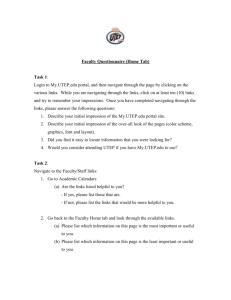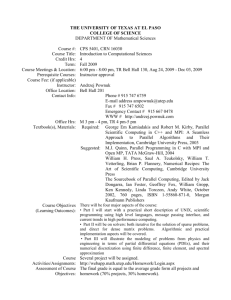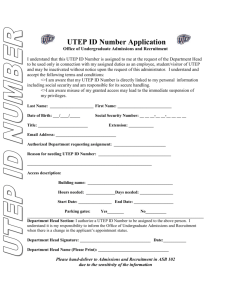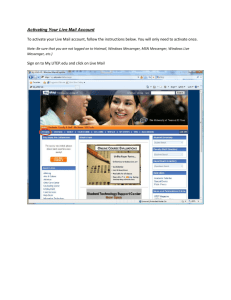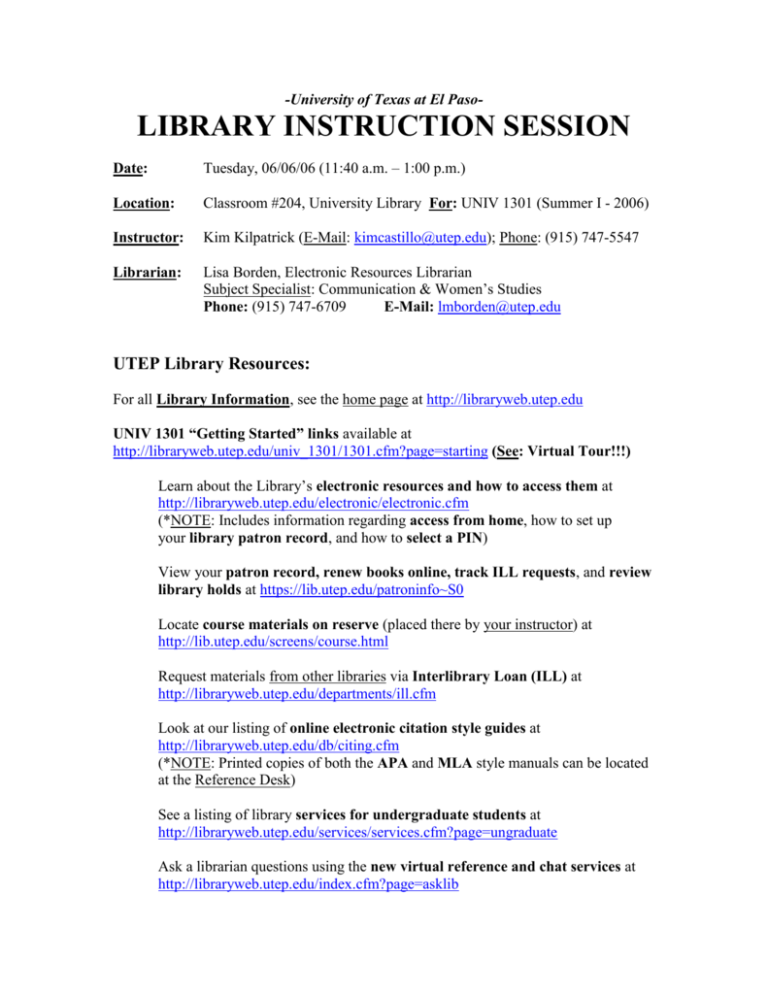
-University of Texas at El Paso-
LIBRARY INSTRUCTION SESSION
Date:
Tuesday, 06/06/06 (11:40 a.m. – 1:00 p.m.)
Location:
Classroom #204, University Library For: UNIV 1301 (Summer I - 2006)
Instructor:
Kim Kilpatrick (E-Mail: kimcastillo@utep.edu); Phone: (915) 747-5547
Librarian:
Lisa Borden, Electronic Resources Librarian
Subject Specialist: Communication & Women’s Studies
Phone: (915) 747-6709
E-Mail: lmborden@utep.edu
UTEP Library Resources:
For all Library Information, see the home page at http://libraryweb.utep.edu
UNIV 1301 “Getting Started” links available at
http://libraryweb.utep.edu/univ_1301/1301.cfm?page=starting (See: Virtual Tour!!!)
Learn about the Library’s electronic resources and how to access them at
http://libraryweb.utep.edu/electronic/electronic.cfm
(*NOTE: Includes information regarding access from home, how to set up
your library patron record, and how to select a PIN)
View your patron record, renew books online, track ILL requests, and review
library holds at https://lib.utep.edu/patroninfo~S0
Locate course materials on reserve (placed there by your instructor) at
http://lib.utep.edu/screens/course.html
Request materials from other libraries via Interlibrary Loan (ILL) at
http://libraryweb.utep.edu/departments/ill.cfm
Look at our listing of online electronic citation style guides at
http://libraryweb.utep.edu/db/citing.cfm
(*NOTE: Printed copies of both the APA and MLA style manuals can be located
at the Reference Desk)
See a listing of library services for undergraduate students at
http://libraryweb.utep.edu/services/services.cfm?page=ungraduate
Ask a librarian questions using the new virtual reference and chat services at
http://libraryweb.utep.edu/index.cfm?page=asklib
Library Instruction for UNIV 1301 – Kilpatrick (Summer 2006)
2
Research Strategies – A General Approach
1)
Plan based on your time frame. Ask yourself the question, “how much time
do I have to get the materials I need?” This is important to note because some
document delivery services, such as Interlibrary Loan, can take up to two
weeks or longer, so plan accordingly.
2)
Start off by finding out what’s easily available within the UTEP Library,
either in printed format or in electronic format. Check Nugget, the UTEP
Library Catalog, along with any electronic databases relevant to your search.
Look for links to full text items, if available, but don’t overlook the fact that
many items are still provided in printed format. If you limit your
searching to electronic full text items only, you will certainly miss many just
as relevant and valuable printed resources. Please don’t hesitate to ask at the
Reference Desk for help if you’re not sure how to find something.
3)
If some of the items you need aren’t available in the UTEP Library, check
other libraries in the immediate local area (i.e. within easy driving distance)
to see if they can be obtained there. Note that the UTEP Library has a
reciprocal checkout agreement with the NMSU libraries: UTEP students,
faculty, and staff can check books out at NMSU and vice versa. Links to
other libraries may be found at http://libraryweb.utep.edu/db/otherlibs.cfm.
4)
In the event that some of the materials you need are available neither at the
UTEP Library nor at other libraries in the immediate local area, you will have
to order these via Interlibrary Loan or another document delivery service, if
time permits. A good resource for checking overall availability of Interlibrary
Loan materials is the international database WorldCat (OCLC/FS) (see link on
the “Other Libraries” web page above). When looking for journals, remember
to always double-check each library’s holdings for that title to verify that
the volume/issue you need is, in fact, held by that library.
5)
If time and convenience are pressing factors, you may want to employ special
strategies such as fee-based document delivery services or by networking
with friends or colleagues at other universities to obtain your materials. Feebased document delivery services such as Ingenta Connect may come in
handy if you don’t have the luxury of time to wait for Interlibrary Loan. Be
sure to double-check for any local rules, copyright, or licensing
restrictions that may apply. Some authors are most cooperative about
sending out copies of article reprints, reports, and the like, upon request. It’s a
good way to practice networking with colleagues or peers in your field.
6)
If you’re not sure what to do or how to begin, PLEASE don’t hesitate to ask
for help either in person, via phone, or by e-mail. The UTEP Library staff are
always willing to help out whenever they can.
Library Instruction for UNIV 1301 – Kilpatrick (Summer 2006)
3
Locating Materials in the UTEP Library about Music and Song Writers for
your UNIV 1301 Course
How to locate books, magazines, academic journals, government documents, etc.
Strategy:
Perform a search for these materials in Nugget, the UTEP Library’s Catalog. Links to the
catalog are available from the UTEP Library’s home page. Various types of searches can
be performed as needed, including keyword, author, title, subject, call number, etc. Note
that many searches can be limited by language, material type, location, and the like.
Records may be printed out, e-mailed, or saved to diskette as appropriate (See
“Save Marked Records,” “Save all on Page,” and “View Saved” buttons). Make sure
to “Clear Saved Records” after printing, e-mailing, or saving each batch otherwise
Nugget will cache or append each successive batch of records to the group, resulting in
duplication. Some of the Library’s subscription databases provide a direct link to Nugget
right from their search interfaces to make it easier to verify our holdings information.
FYI: Do not use Nugget to search the content or articles in a journal! Use the
Library’s electronic databases to search the content or articles in a journal!
NEW FEATURE: It is now possible to save “preferred searches” when logged into
Nugget from the patron record (“View Your Records”) screen!
Hands-On Exercise:
SETTING UP “PREFERRED” SEARCHES IN
NUGGET
NOTE: Many of the bibliographic records in Nugget, the UTEP Library Catalog, are
very brief and don’t contain much detailed information regarding what the book, journal,
government document, or other item, is about. Some records will contain a note showing
the book’s “table of contents,” for example, but not the full text. However, those that are
“electronic books” will include a link to the complete full text that can be viewed online
through a database called netLibrary. To “borrow” a netLibrary book, you must set up
your own account with the service that will allow you to “check out” the book and view it
online for a period of two hours. In most cases, however, the book, journal, or other
item, must be retrieved and examined to determine its actual subject content.
REMEMBER: You may be required to turn in copies of all sources that you used!
For books, make photocopies of the title page, title page verso (back-side of title page),
and all relevant chapters or passages that you paraphrased from or quoted directly.
Hands-On Exercise:
SAMPLE KEYWORD SEARCHING IN
NUGGET BASED ON CLASS TOPICS
Library Instruction for UNIV 1301 – Kilpatrick (Summer 2006)
Hands-On Exercise:
4
SUBJECT SEARCHING IN NUGGET BASED
ON KEYWORD SEARCHES (ABOVE)
NOTE: Phrase searching and combining search terms with Boolean
operators AND, OR, NOT helps to broaden or narrow down your topic.
NOTE: Keyword searching is a great way to determine what Library of
Congress (LC) subject heading(s) would be most useful for your topic.
Hands-On Exercise:
E-MAILING BIBLIOGRAPHIC CITATIONS
FROM NUGGET
How to read a call number:
Definition: A call number is a unique number (like a street address) assigned to
nearly every item that is physically owned by the UTEP library. Books and
journals, for example, are arranged in call number order according to the
Library of Congress (LC) classification system. Here is a broad interpretation
of the LC call number for the following example book:
Author: Baney, Joan.
Title: Guide to Interpersonal Communication / Joan Baney.
Imprint (Publisher): Upper Saddle River, N.J.: Pearson/Prentice Hall, 2003.
Call Number:
P
94.7
.B36
2003
(Line 1)
(Line 2)
(Line 3)
(Date of publication)
The first line is composed of a letter or series of letters, shelved in alphabetical
order. These letters define the general subject area. For example, P falls
under the main class of Language and Literature, then under the subclass of
Philology -- Linguistics.
The second line is a numeric whole number, shelved in numeric order. These
numbers further define or narrow down a book’s specific subject. For example,
P 94.7 falls under Interpersonal Communication.
The third and following lines begin with letters followed by decimal numbers
that are shelved in decimal order. These are the “Cutter Numbers” and further
identify a book according to more specific subject, author, title, or some other
designator, depending on the classification requirements for work in question. A
cutter number will not always be assigned for each of these areas, however.
Library Instruction for UNIV 1301 – Kilpatrick (Summer 2006)
5
NOTE: For a more in-depth look at the LC classification system, please see the
handout at http://univstudies.utep.edu/~infoliteracy/call_numbers_rev.htm
How to search for magazines and academic journals in printed format
Strategy:
To check and see whether or not the UTEP Library owns a printed copy of the magazine
or academic journal you need, you’ll need to do a title search for the journal in Nugget,
the UTEP Library Catalog. Remember to get the call number for the journal and
determine what floor of the Library it’s located on. All of this information will be
contained in the Nugget record for the journal. Make sure that you have complete
bibliographic citation information for the journal article you need or it will be very
difficult to find on the shelves. For example, you should make note of which volume,
issue, and publication year/month you need for each article, including page numbers,
author(s), and article title. Once you find a printed copy of your article, you can then
make a photocopy of it and use it for your UNIV 1301 assignment.
Hands-On Exercise:
SEARCHNG FOR PRINTED JOURNALS OR
MAGAZINES IN NUGGET
How to locate a current listing of all of the Library’s electronic journals
Strategy:
As a general rule, most materials that are physically owned by the UTEP Library can be
found in Nugget, the UTEP Library Catalog. Because of the constant changes in
electronic journal holdings, however, the Library maintains a separate listing of these
items at http://fu5wr4ks6k.search.serialssolutions.com/. NOTE: The E-Journal Portal
is ACCESSIBLE FROM HOME but you’ll need to set up your library patron
record FIRST, in most cases.
Journal titles may be searched or browsed both alphabetically and by subject.
Some of the links will take you directly to the journal’s table of contents page where you
can access your journal by volume and/or issue number. Others will take you only to the
search interface of the database in which the journal is contained and you will have to reperform your search in order to locate the needed article. Many of these titles are indexed
or tracked for content in the electronic databases listed below.
Hands-On Exercise:
SEARCHNG FOR ELECTRONIC JOURNALS
IN THE E-JOURNAL PORTAL
*Important Point to Remember: Not all of the Library’s resources are available in
electronic or online format. The bulk is available in printed format only and works just
as well as the online format.
Library Instruction for UNIV 1301 – Kilpatrick (Summer 2006)
6
How to search the Library’s electronic databases for journal, magazine, or newspaper
articles dealing with Music and Song Writers for your UNIV 1301 class
Strategy:
Locating appropriate academic journal, magazine, and newspaper literature dealing with
the subject area of Music and Song Writers presents a variety of unique challenges.
There is no single source at the UTEP Library that will allow you to search the entire
wealth and scope of this literature, in all of its manifestations, at one time. Therefore,
plan on using a flexible search strategy that will encompass several of the Library’s
subscription electronic resources across many different subject areas, as well as Internetbased resources you locate on the World Wide Web (WWW). Be prepared to do a little
navigating through the various search interfaces you’ll encounter in the process, since
they will all be somewhat different in terms of design, content, and validity. Features and
functionality, especially with the subscription electronic databases, will show much more
similarity and will allow you to determine patterns that will increase your information
literacy with respect to which electronic resources are best for this topic.
First, try to determine which of the Library’s electronic databases would be the most
useful for finding materials in your chosen subject area. If you need to find specific types
of resources such as books, government documents, newspapers, magazines, journal
articles, or Internet sites, your search strategy will need to include electronic databases
that index or track the types of resources you need. For example, if you need to locate
books on your topic that are available at UTEP, an appropriate choice would be
Nugget, the UTEP Library Catalog. If you need to find journal articles relevant to
your topic, the best approach would be to search in a comprehensive, primary indexing
database for your subject area, if available. Next, take a look at secondary indexes,
partial full text databases, or full text databases relevant to your subject area. Note that
overall subject coverage will be the most complete in a primary index; secondary
indexes generally provide overlapping or somewhat duplicated subject coverage. Full
text electronic databases are good sources of content when printed materials are
physically unavailable at the Library.
FYI: Use the Library’s electronic databases to search the contents of a journal. This
is usually easier and faster than searching each volume and issue on the shelves by
hand. If the database you’re searching doesn’t provide the full text article or a direct link
to it, check Nugget or the E-Journal Portal to see if UTEP has either a printed copy or an
electronic copy of the one you need.
Remember the Electronic Resource “Relationships:”
Remember that many databases will either: 1) provide you with full text content within
the database itself, 2) link to full text content in another database (access based on
institutional subscriptions), 3) link to Nugget, the UTEP Library Catalog, so you can
check to see if the Library has a print copy of the item you need if full text isn’t available,
or 4) link to the Library’s E-Journal Portal so you can check to see if there’s an electronic
Library Instruction for UNIV 1301 – Kilpatrick (Summer 2006)
7
or virtual copy of the item you need, if the database you’re currently searching doesn’t
provide the full text or link to full text. Also, remember that even though the Library’s
subscription electronic databases are Internet-based, they and their content are different
from what’s available on the open Internet, or World Wide Web (WWW).
NOTE: A wide range of online indexing databases, grouped together by subject or
category, can be located on the Library’s “Electronic Databases” web page at
http://libraryweb.utep.edu/db/index.cfm. From this page, specific online databases can be
located alphabetically by title and also by keywords in the database title. Some of the
online products listed below will be demonstrated during class, as time permits.
Suggested electronic databases for UNIV 1301 assignments:
Short List:
Academic Search Premier (EBSCO)
Arts & Humanities Search (OCLC/FS)
Grove Music Online (OUP)
IIMP Full Text: International Index to Music Periodicals (ProQuest)
RILM (Répertoire International de Littérature Musicale) Abstracts of Music Literature
(EBSCO)
Descriptive List:
Academic Search Premier (EBSCO) -- Comprehensive, multidisciplinary index
complete with citations, abstracts, and some full text. Formats indexed include books,
newspapers, and magazines, as well as scholarly and peer-reviewed journals. Subject
coverage includes social sciences, arts and humanities, education, computer sciences,
engineering, physics, chemistry, language and linguistics, health sciences, multicultural
studies, and many more. Coverage: 1975 - present (updated daily).
Sample KEYWORD search based on class topics
NOTE: You can set limits for retrieval of either periodicals or
academic/scholarly/peer-reviewed journal, since this database indexes or tracks
periodicals, newspapers, and books.
Sample SUBJECT search based on class topics
NOTE: Click on the “subject terms” button from the green navigation bar at top
of screen and choose “relevancy ranked.” Enter the terms of your choice, then
click on the “browse” button at top/right of screen to view results. After
selecting the most relevant subject heading by marking it with a check, add it to
your search so the term (prefix DE=Descriptor) appears in the “find” box above.
View the bibliographic citations for that term by clicking on the “search” button.
You can combine several subject descriptors or combine a subject descriptor and
Library Instruction for UNIV 1301 – Kilpatrick (Summer 2006)
8
a keyword using the Boolean operators: AND, OR, NOT; these will also help to
narrow down or broaden your topic.
Arts & Humanities Search (OCLC/FS) -- Bibliographic index for arts and humanities,
social sciences, and science literature drawn from the following source publications:
journal articles, bibliographies, editorials, letters, and reviews. Some citations include
links to full text, based on institutional subscriptions. Coverage: 1980 - present (updated
weekly).
Grove Music Online (OUP) -- Provides complete full text access to the 29-volume New
Grove Dictionary of Music and Musicians (second edition, 2001), the four-volume New
Grove Dictionary of Opera (1992), and the three-volume New Grove Dictionary of Jazz
(second edition, 2002). Articles that have been updated since their appearance in print are
date-stamped in the upper right corner of the screen. Updated annually.
IIMP Full Text: International Index to Music Periodicals (ProQuest) -- Covers a
variety of topics in the field of music including performance, theory and composition,
music education, jazz and ethnomusicology. Provides indexing and abstracts for more
than 420 international music and performing arts periodicals, plus full text for 83
journals. Every citation from 1996 to present contains an abstract. Coverage varies by
title, ranging from 1874 to present. Majority of content ranges from 1996 to present.
Updated monthly.
RILM (Répertoire International de Littérature Musicale) Abstracts of Music
Literature (EBSCO) -- Comprehensive bibliographic index for international music
literature. Subject coverage includes acoustics, criticism, dance, dramatic arts,
ethnomusicology, instruments and voice, historical musicology, literature, music therapy,
pedagogy, performance practice and notation, theory and analysis, visual arts, and many
more. Materials indexed include scholarly journals, articles, books, bibliographies,
catalogues, conference proceedings, discographies, dissertations, ethnographic
recordings, Festschriften, films, iconographies, videos, concert reviews, recording notes,
and pedagogical manuals. Most citations include abstracts. Coverage: 1969 - present
(monthly updates).
How to search for and evaluate materials relevant to your chosen topic
Strategy:
1) Choose a topic based on your given assignment.
2) Determine how many and what types of information resources you’ll need based
on your assignment.
3) Familiarize yourself with the required writing style (such as MLA or APA).
Library Instruction for UNIV 1301 – Kilpatrick (Summer 2006)
9
4) Make sure to gather sufficient citation information for each of the resources you’ll
list on your bibliography or “works cited” pages. Remember to keep a paper
copy in your files, save an electronic copy on a diskette or USB, or send an
electronic copy to your e-mail for later use when writing your papers. PDF
format is recommended because it is a full-image replica of the actual printed
article and it also includes accurate pagination. For books, it’s a good idea to
make photocopies of the title page (front and back – or “verso”) as well as each of
the passages you quote directly or paraphrase when writing your papers.
Hands-On Exercise:
WORKING WITH BIBLIOGRAPHIC
CITATIONS FOR ARTICLES
a. How to find and interpret bibliographic information in citations.
b. How to determine if a citation includes an abstract only or full text.
FYI: Make sure you understand the difference between the abstract
(summary) of an article and the complete full text of that article, whether
it’s from a journal or a magazine. Submitting a copy of an article’s
abstract to your instructor is not the same thing as turning in a copy of the
complete full text of that article. Make sure to acquire the complete full
text of each online article you use for your UNIV 1301 assignment!!!
c. How to find out whether the UTEP Library has a printed or electronic
copy of the publication you’re looking for.
d. How to locate URLs (Uniform Resource Locators) for electronic
databases on the UTEP Library’s web site (see the “About” link for each
product on the “Databases” page).
Hands-On Exercise:
E-MAILING/SAVING
BIBLIOGRAPHIC CITATIONS AND
FULL TEXT ARTICLES
5) Regarding Internet-based resources, if allowed by your instructor, choose only
those that are produced by authoritative sources such as government (.gov),
military (.mil), professional (.org), or educational (.edu) agencies. For more help
with evaluating Internet sites, see
http://libraryweb.utep.edu/univ_1301/1301.cfm?page=evaluation.
6) For magazine or journal articles about your topic, choose only those that include a
bibliography or list of works cited at the end of the paper. Research articles that
show evidence of being based on well-documented or “cited” research are more
valid and are therefore better sources of information than non-documented ones.
Library Instruction for UNIV 1301 – Kilpatrick (Summer 2006) 10
7) When using newspaper articles, you should typically avoid editorials and opinion
pieces. Rely instead on news articles (international/national/regional/local).
8) If you need to locate articles from peer-reviewed or refereed journals, note
that certain databases will include information about the journal, including
whether or not some or all of its content is examined by an editorial body
before being accepted for publication. Another good source for this type of
information is Ulrich’s Periodicals Directory (Bowker), available both online
and in printed format (located at the Reference Desk).
How to familiarize yourself with library terminology
Strategy:
Most of the library terms used in this class can be found on the free web site ODLIS
(Online Dictionary for Library and Information Science) at
http://lu.com/odlis/about.cfm.
Hands-On Exercise:
LOOK UP THE DEFINITION FOR THE
TERM “CITATION”
Suggested reference books in printed format
TITLE:
IMPRINT:
CALL #:
The Greenwood encyclopedia of rock history.
Westport, Conn. : Greenwood Press, 2006.
ML3534 .G754 2006.
AUTHOR:
TITLE:
IMPRINT:
CALL #:
Taruskin, Richard.
The Oxford history of western music / Richard Taruskin.
New York : Oxford University Press, 2005.
ML160 .T18 2005.
AUTHOR:
TITLE:
Wright-McLeod, Brian, 1958The encyclopedia of native music : more than a century of
recordings from wax cylinder to the Internet / Brian WrightMcLeod ; illustrated with photographs and album covers.
Tucson : The University of Arizona Press, c2005.
ML156.4.I5 W75 2005.
IMPRINT:
CALL #:
AUTHOR:
TITLE:
IMPRINT:
CALL #:
Axford, Elizabeth C., 1958Song sheets to software : a guide to print music, software, and
web sites for musicians / Elizabeth C. Axford.
Lanham, Md. : Scarecrow Press, c2004.
ML74.7 .A94 2004.
Library Instruction for UNIV 1301 – Kilpatrick (Summer 2006) 11
TITLE:
IMPRINT:
CALL #:
AUTHOR:
TITLE:
The handbook of Texas music / editorial board, Roy Barkley [et al.].
Austin : Texas State Historical Association in cooperation with
the Center for Studies in Texas History at the University of
Texas at Austin, c2003.
ML106.U4 T35 2003.
IMPRINT:
CALL #:
Jasen, David A.
A century of American popular music : 2000 best-loved and
remembered songs (1899-1999) / David A. Jasen.
New York : Routledge, 2002.
ML128.P63 J37 2002.
AUTHOR:
TITLE:
IMPRINT:
CALL #:
Hall, Charles J.
Chronology of Western classical music / Charles J. Hall.
New York : Routledge, 2002.
ML161 .H227 2002.
TITLE:
Women and music in America since 1900 : an encyclopedia / edited
by Kristine H. Burns.
Westport, Conn. : Greenwood Press, 2002.
ML82 .W625 2002.
IMPRINT:
CALL #:
AUTHOR:
TITLE:
IMPRINT:
CALL #:
TITLE:
Ficher, Miguel, 1922Latin American classical composers : a biographical dictionary /
compiled and edited by Miguel Ficher, Martha Furman Schleifer,
John M. Furman.
Lanham, Md. : Scarecrow Press, 2002.
ML105 .F53 2002.
IMPRINT:
CALL #:
The new Grove dictionary of music and musicians / edited by
Stanley Sadie ; executive editor, John Tyrrell.
New York : Grove, 2001.
ML100 .N48 2001.
TITLE:
IMPRINT:
CALL #:
Baker's biographical dictionary of musicians.
New York : Schirmer Books, c2001.
ML105 .B16 2001.
TITLE:
International dictionary of black composers / editor Samuel A.
Floyd Jr.
Chicago ; London : Fitzroy Dearborn, 1999.
ML390 .I58 1999.
IMPRINT:
CALL #:


